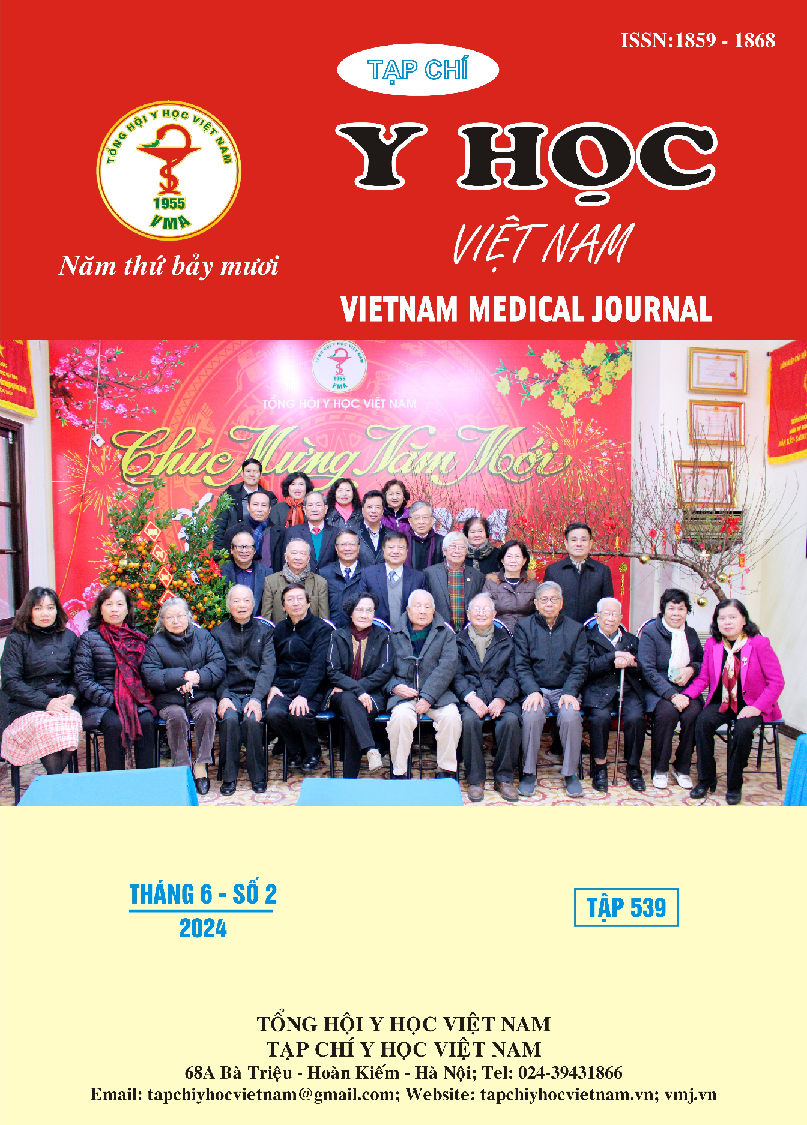THE IMPACT OF COMPLETE REVASCULARIZATION ON RECURRENCE OF CHEST PAIN IN PATIENTS WITH ST-SEGMENT ELEVATION MYOCARDIAL INFARCTION AND MULTIVESSEL DISEASE
Main Article Content
Abstract
Objective: This study aimed to assess the hospitalization rate for recurrent chest pain following complete versus incomplete revascularization in patients with ST-segment elevation myocardial infarction (STEMI) and multivessel disease. Subjects and methods: A prospective cohort study was conducted on STEMI patients undergoing revascularization procedures from April 2022 to June 2022 at the Interventional Cardiology and Cardiology Departments of Cho Ray Hospital. Results: The study included 105 patients (69.5% male, mean age 64.1 ± 11.5) with a high prevalence of cardiovascular risk factors, notably dyslipidemia (88.6%) and hypertension (73.3%). The complete revascularization group exhibited lower recurrence of chest pain requiring hospitalization at 1 month (6.1% vs. 9.8%) and 3 months (12.1% vs. 29.2%). Although statistical significance was not reached (p = 0.72 and 0.08), the Kaplan-Meier curve indicated a noticeable divergence in recurrence rates over time. Patients with incomplete revascularization, especially those with an untreated LAD branch, had a significantly higher risk of hospitalization due to chest pain compared to those untreated in other coronary branches (52.4% vs. 19.6%, HR = 2.23, 95% CI: 1.13–6.25; p = 0.026). Conclusion: The study suggests a trend toward a reduced risk of hospitalization for recurrent chest pain with complete revascularization in STEMI patients with multivessel disease. For patients not achieving complete revascularization, particularly when the LAD branch is untreated, the risk of rehospitalization due to recurrent chest pain is significantly elevated.
Article Details
Keywords
Recurrent chest pain, multivessel coronary artery disease, incomplete revascularization
References
2. Byrne RA, Rossello X, Coughlan JJ, et al. 2023 ESC Guidelines for the management of acute coronary syndromes. European heart journal. Oct 12 2023;44(38):3720-3826. doi:10.1093/ eurheartj/ehad191
3. Ibanez B, James S, Agewall S, et al. 2017 ESC Guidelines for the management of acute myocardial infarction in patients presenting with ST-segment elevation: The Task Force for the management of acute myocardial infarction in patients presenting with ST-segment elevation of the European Society of Cardiology (ESC). European heart journal. Jan 7 2018;39(2):119-177. doi:10.1093/eurheartj/ehx393
4. Wald DS, Morris JK, Wald NJ, et al. Randomized trial of preventive angioplasty in myocardial infarction. The New England journal of medicine. Sep 19 2013;369(12):1115-23. doi: 10.1056/NEJMoa1305520
5. Szummer K, Wallentin L, Lindhagen L, et al. Improved outcomes in patients with ST-elevation myocardial infarction during the last 20 years are related to implementation of evidence-based treatments: experiences from the SWEDEHEART registry 1995-2014. European heart journal. Nov 1 2017; 38(41): 3056-3065. doi:10.1093/eurheartj/ ehx515
6. Gershlick AH, Khan JN, Kelly DJ, et al. Randomized trial of complete versus lesion-only revascularization in patients undergoing primary percutaneous coronary intervention for STEMI and multivessel disease: the CvLPRIT trial. Journal of the American College of Cardiology. Mar 17 2015; 65(10): 963-72. doi:10.1016/j.jacc.2014. 12.038
7. Engstrøm T, Kelbæk H, Helqvist S, et al. Complete revascularisation versus treatment of the culprit lesion only in patients with ST-segment elevation myocardial infarction and multivessel disease (DANAMI-3—PRIMULTI): an open-label, randomised controlled trial. Lancet (London, England). Aug 15 2015;386(9994):665-71. doi: 10.1016/s0140-6736(15)60648-1
8. Ibrahim H, Sharma PK, Cohen DJ, et al. Multivessel Versus Culprit Vessel-Only Percutaneous Coronary Intervention Among Patients With Acute Myocardial Infarction: Insights From the TRANSLATE-ACS Observational Study. Journal of the American Heart Association. Oct 5 2017;6(10)doi:10.1161/jaha.117.006343
9. Kim LK, Yeo I, Cheung JW, et al. Thirty‐Day readmission rates, timing, causes, and costs after ST‐Segment–Elevation myocardial infarction in the United States: a national readmission database analysis 2010–2014. Journal of the American Heart Association. 2018;7(18):e009863.


